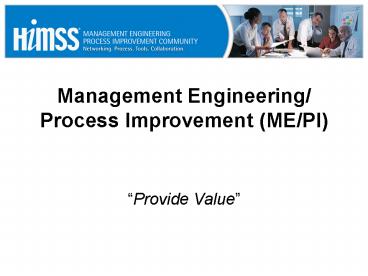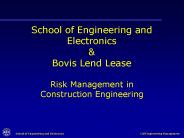Management Engineering/ Process Improvement (ME/PI) - PowerPoint PPT Presentation
1 / 30
Title: Management Engineering/ Process Improvement (ME/PI)
1
Management Engineering/ Process Improvement
(ME/PI)
- Provide Value
2
What is a Management Engineer or Process
Improvement (ME/PI) Professional?
- Process Improvement (PI) professionals address
the design, installation, and improvement of
integrated systems of people, material,
facilities, information, equipment and energy. - They bring a wide variety of work experience and
educational backgrounds to the job.
3
Education
- BS, Industrial Engineering, Management
Engineering or Operations Research - MBA, MHA, MSIE, MS Operations Research or Health
Systems - PhD, MBA, MHA, BSBA Business Management or
initial clinical background such as RN, RHIA,
RHIT - PhD, MHA, Allied Health Professionals with
Business/Engineering minors - Six-Sigma, Lean, CPHIMS, CPHQ, and other
certifications
4
Key Practice Skills
- Analytical - a solid knowledge and experience
with - quantitative statistical techniques and tools
- process improvement programs (Lean, 6-Sigma, .)
- demand and supply forecasting
- workload and schedule optimization
- engineering economics, financial analysis and
decision support - queuing theory
- workflow analysis
- simulation modeling
- the quality process
Formal Education
5
Key Practice Skills (continued)
- The ability to
- collaborative with people in complex
organizations - manage the design and implementation of processes
and systems - promote ideas and influence change in a
organization - teach others the quality management problem
solving tools - teach and deploy business improvement methods and
tools
Informal Education
6
Key Practice Skills (continued)
- Profound knowledge of
- JCAHO and other licensing standards
- clinical protocols and clinical outcomes
- hospital organization structure and
interrelationships
Healthcare Education
7
ME/PI Philosophy
- To provide value by
- Advancing a win-win culture
- Promoting customer centric environment
- Improving the system of production, service, and
planning Constantly! - Educating and transferring skills to departments
to assist them to realize their full potential - Breaking down barriers between departments and
becoming a catalyst for lasting improvements - Promoting continuous quality improvement
8
ME/PI Profession Current State
9
Current State
- Responsibilities and accountabilities are not
universally defined - Sometimes were Jacks of all trades
- Reporting structure depends on the institution
- Lack of direction
- Skill set, education and training has not been
standardized leading a broad arrays of
professionals - No set continual education or certification
- Prevalence of soft skills in the profession
10
Current State (cont.)
- Career path is sometimes limited
- In industry people with our skills are frequently
brought into senior management - Seen as cost versus revenue departments
- Savings multipliers not touted
- Project benefits not advertised
11
ME/PI Concept
Customer
Performance Improvement
Resource Management
IT Engagement
12
Performance Improvement Function
ME/PI Concept
- Operational audits
- Outcome measurements
- Service quality audit and evaluations
- Process identification, documentation and
evaluation - Streamline or tweak existing processes
- Design off current processes
- Enhance value added activities
- Modify existing systems
- Conduct staff skill audits
13
Performance Improvement (cont.)
ME/PI Concept
- Identifying process and outcome measures
- Performing quantitative and qualitative analysis
- Aligning measures to meet organizational goals
- Designing Scorecards
- Evaluating system capacity
- Establishing performance targets
- Initiate DMAIC projects
14
Performance Improvement Tools
ME/PI Concept
- Root cause analysis
- FMECA
- DOE
- Kanban
- SPC/SQC
- Performance Benchmarking
- Poka-Yoka
- Etc.
- Department Functional Tree Structure
- Process mapping and analysis
- Value stream mapping
- Simulation (Modeling)
- 5 Ss
- Kaizen
- Lean
- Six Sigma DMAIC (Define, Measure, Analyze,
Improve, Control)
15
Performance Improvement Tools (Cont.)
ME/PI Concept
- Internal and External Benchmarking
- Develop opportunity matrices based on current
department performance - Utilizing Action OI Reports for operational
benchmarking - Attending and facilitating departmental and
interdepartmental meetings
16
Performance Improvement Tools (Cont.)
ME/PI Concept
- Operational Benchmark Indicators
- Paid FTEs/Adjusted Occupied Bed
- Paid Hours/Discharge
- Management FTEs/Total FTEs
- Department Paid Hours/Unit of Service Volume
- Square Feet/Adjusted Discharge
- Over Time as a Percentage of Paid FTEs
- Agency, Temp, Contract FTEs as a of Total Paid
FTEs - Adjusted Admission/Active Physician
- Percent Occupancy
- Surgery Suite Utilization
17
Performance Improvement Tools (Cont.)
ME/PI Concept
- Financial Benchmarks Indicators
- Salary Benefits as a of Net Revenue
- Labor Expense/Adjusted Discharge
- Non-Labor Expense (Supply, Drug, etc.)/ Adjusted
Discharge - Days in Accounts Receivable
- Bad Debt Percentage
- Revenue Per Adjusted Discharge
18
Performance Improvement Tools (Cont.)
ME/PI Concept
- Clinical Benchmarks Indicators
- Case Mix Adjusted Average Length of Stay
- Mortality
- Tests per case per physician
19
Patient Treatment Concept
Process
Happy Customer
Input
Staff Hours
Supplies
Equipment
Voice of Process
Voice of Customer
20
Resource Management Function
ME/PI Concept
- Service utilization evaluation
- Supply standardization audit
- Departmental staffing pattern audit and
evaluation - Supply chain Management evaluation
- Service utilization benchmarking
21
Resource Management Activities
ME/PI Concept
- Clinical Process outcome analysis
- Clinical Process Benchmarking
- Productivity Analysis
- In-Quality Staffing
- Physician Profiling
- Cost Per Case
- Supply Chain Management (SCM)
22
Productivity Measurement and Analysis
ME/PI Concept
- Measuring workload, identifying patterns and
trends - Identifying labor utilization, by type and cost
impact - Matching staffing to demand In-Quality Staffing
23
ME/PI Concept
In Quality Staffing Which customer(s) win?
In Quality plus Process Improvement
Time in Minutes
USL
LSL
Number of Transports
24
Physician Practice Profiling
ME/PI Concept
- Reduce cost through reduction of unnecessary
variation of utilization - Sharing information with providers (Value Added)
- Select cost effective physicians
- Improve patient outcomes
25
IT Engagement Function
ME/PI Concept
- To ensure the success of IT ME/PI provides
following support services - Strategic Planning and strategic analysis
- Needs Assessment
- Assess current and emerging technology
- Feasibility Study
- Project Management
- Cost and Benefit Analysis
- Selection Criteria
- Request for Proposal and/or Information
- Selection of System
- Vendor viability analysis
26
IT Engagement Tools
ME/PI Concept
- Process mapping (As Is and Should Be)
- Gap analysis
- System performance analysis
- System reporting capability analysis
- Project planning
- Project management
- Team and meeting facilitation
- ROI calculation
27
ME/PI ProfessionIdeal Future State
ME/PI Concept
28
Future State
ME/PI Concept
- Well defined roles and responsibilities within
Healthcare - Operational guru
- Starting point for all healthcare operational
leaders - Training ground for healthcare COO, Department
Directors and other healthcare operational
leaders - Defined skill set for the entering to the
profession
29
Future State (cont.)
ME/PI Concept
- Structured on the job training and licensure for
promotion - At least 50 to 70 of ME staff to be trained
engineers - Well developed on the job training program
- Defined minimum performance criteria related to
cost savings, revenue enhancement, and quality
improvement (i.e. Minimum contribution factor to
bottom line should be 3 to 5 times of ME
department cost)
30
ME/PI Concept
Questions
?































